With over 4 years of experience, Meg Miller is passionate about working with animals and agriculture. She's currently going to the University of Missouri to get a Bachelor of Science in General Agriculture. Meg will graduate in 2024. Visit at : Muckrack
Don't wanna be here? Send us removal request.
Text
Meg Miller - An Assistant Teacher
Meg Miller is hyperfocused when it comes to making serious changes in the agricultural and animal science industries. Working more than 4 years as a professional in multiple industries, Miller is also no stranger to the needs of those involved in animal caretaking, agribusiness leadership, and agricultural research.
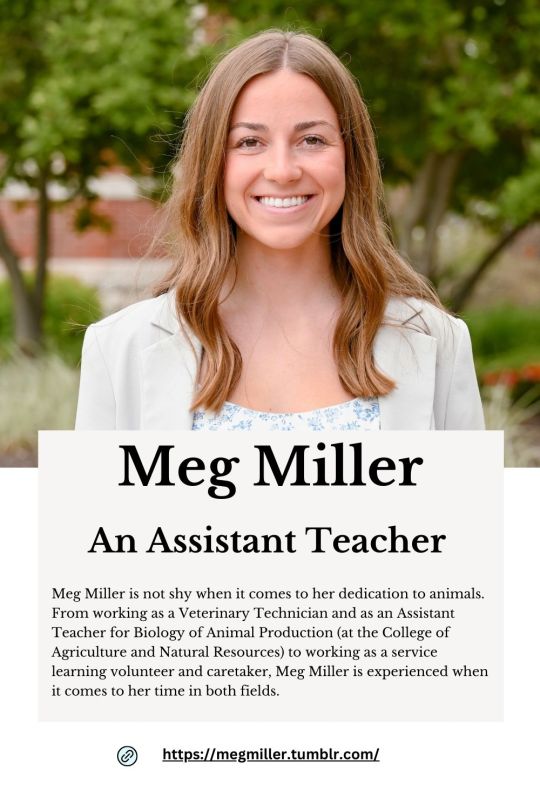
0 notes
Text
Meg Miller - A Veterinary Technician
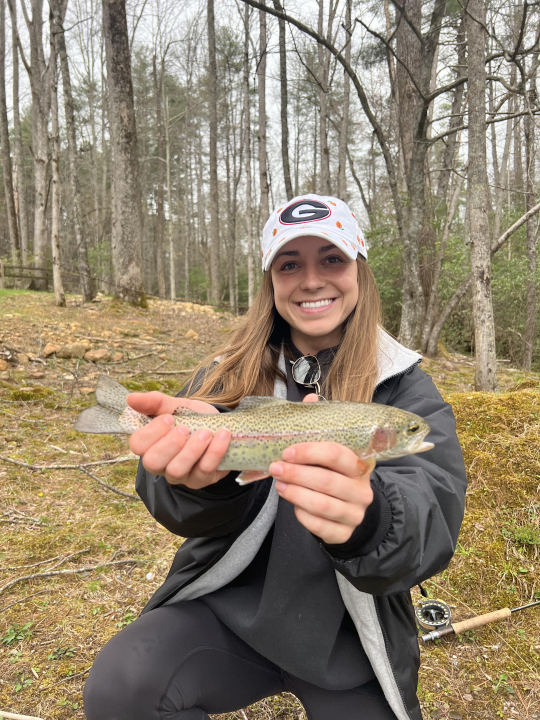
Meg Miller is a dedicated animal lover who is committed to the future of agriculture and animal husbandry. Currently working towards her Bachelor of Science in General Agriculture, Meg Miller has a rich history when it comes to working with both industries. From working as a TA for the College of Agriculture and Natural Resources to working as a volunteer caretaker and a veterinary technician, Miller has a proven track record when it comes to agriculture and animal sciences.
0 notes
Text
Meg Miller - Working as a Veterinary Technician

With more than 4 years of hands-on working experience in agriculture and with animals, Meg Miller is no stranger to animal sciences and agriculture. Miller first began working professionally in March of 2018, when she began working as a Veterinary Technician. Since then, she has since worked as everything from a teaching assistant for Biology of Animal Production to a farm hand. Meg Miller is currently working towards achieving her Bachelor of Science in General Agriculture at the University of Missouri.
1 note
·
View note
Text
Meg Miller - Working as a Veterinary Technician

With more than 4 years of working experience in agriculture and with animals, Meg Miller is well-versed in what it takes to manage farms, homesteads, and entire classrooms of eager students who are interested in learning even more about working in agriculture and with animals themselves. Miller is currently working towards her degree in Science in General Agriculture with a concentration on both Animal Science and Agribusiness Management. She is also seeking a minor in both Innovation Management and Entrepreneurship.
1 note
·
View note
Text
Meg Miller - Focusing on Agribusiness Management

Meg Miller has a long history when it comes to working in a professional setting involving animals and agricultural research. From working as a Teaching Assistant for Biology of Animal Production for the College of Agriculture and Natural Resources to working as an official Veterinary Technician, Miller has no shortage of experience in the agricultural and animal sectors. Currently, Meg Miller is furthering her professional education at the University of Missouri, where she is working toward her degree in Science in General Agriculture.
1 note
·
View note
Text
Meg Miller - Hands-on Working Experience in Agriculture
Working in Agribusiness Management is nothing new for Meg Miller, who has been working hands-on with animals and in agriculture professionally for more than 4 years. Beginning in 2018 as a Veterinary Technician, Meg Miller has since expanded her teaching to positions such as an official teaching assistant for Biology of Animal Production at the College of Agriculture and Natural Resources in 2021. Today, Meg Miller is still continuing her education in the pursuit of a Bachelor of Science in General Agriculture.
1 note
·
View note
Text
Meg Miller - Veterinary Technician
Meg Miller has a long history when it comes to working in a professional setting involving animals and agricultural research. From working as a Teaching Assistant for Biology of Animal Production for the College of Agriculture and Natural Resources to working as an official Veterinary Technician, Miller has no shortage of experience in the agricultural and animal sectors. Currently, Meg Miller is furthering her professional education at the University of Missouri, where she is working toward her degree in Science in General Agriculture.
1 note
·
View note
Text
Meg Miller - A Teaching Assistant
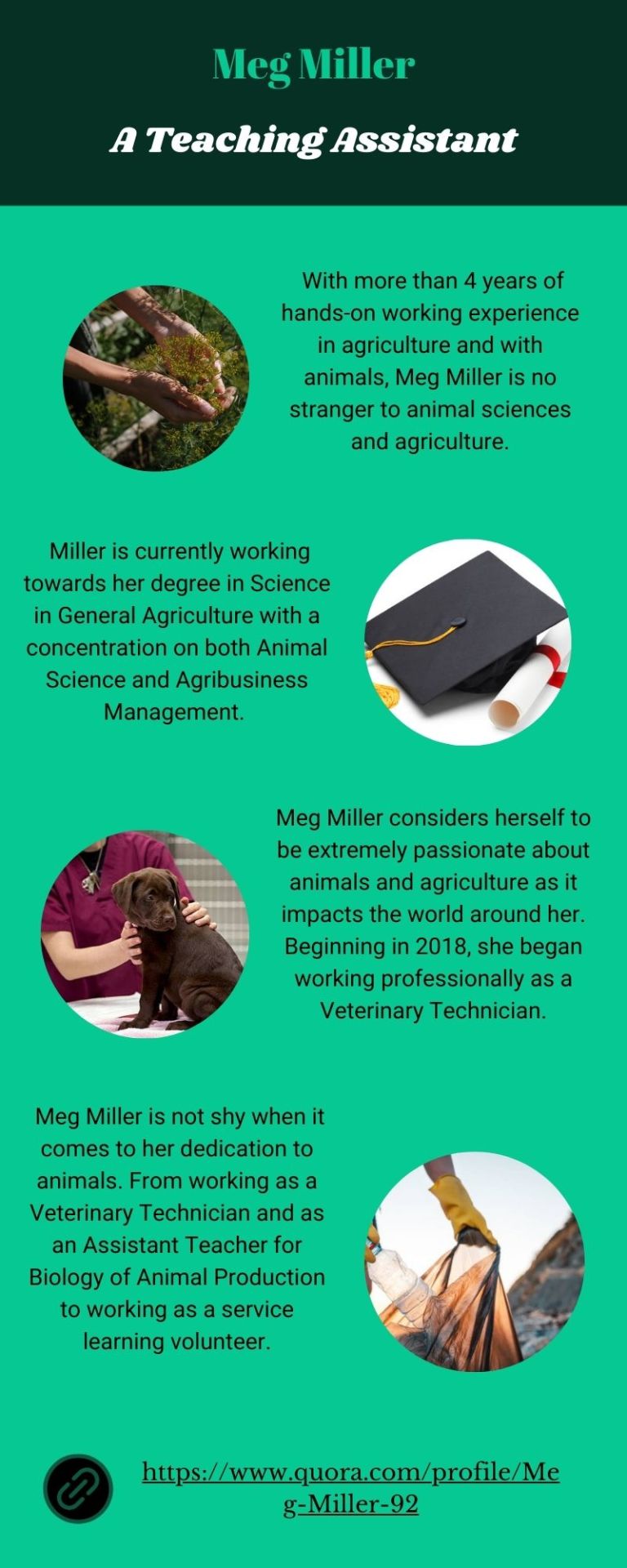
Meg Miller has a long history when it comes to working in a professional setting involving animals and agricultural research. From working as a Teaching Assistant for Biology of Animal Production for the College of Agriculture and Natural Resources to working as an official Veterinary Technician, Miller has no shortage of experience in the agricultural and animal sectors.
0 notes
Text
Meg Miller - Teaching Assistant for Biology
Meg Miller is not shy when it comes to her dedication to animals. From working as a Veterinary Technician and as an Assistant Teacher for Biology of Animal Production (at the College of Agriculture and Natural Resources) to working as a service learning volunteer and caretaker, Meg Miller is experienced when it comes to her time in both fields. Meg Miller is working towards her Bachelor of Science in General Agriculture with a minor focus on Entrepreneurship at the University of Missouri.
1 note
·
View note
Text
Meg Miller - A Focus on Agricultural Leadership
Working in Agribusiness Management is nothing new for Meg Miller, who has been working hands-on with animals and in agriculture professionally for more than 4 years. Beginning in 2018 as a Veterinary Technician, Meg Miller has since expanded her teaching to positions such as an official teaching assistant for Biology of Animal Production at the College of Agriculture and Natural Resources in 2021. Today, Meg Miller is still continuing her education in the pursuit of a Bachelor of Science in General Agriculture.
1 note
·
View note
Text
Meg Miller - A Concentration on Animal Sciences
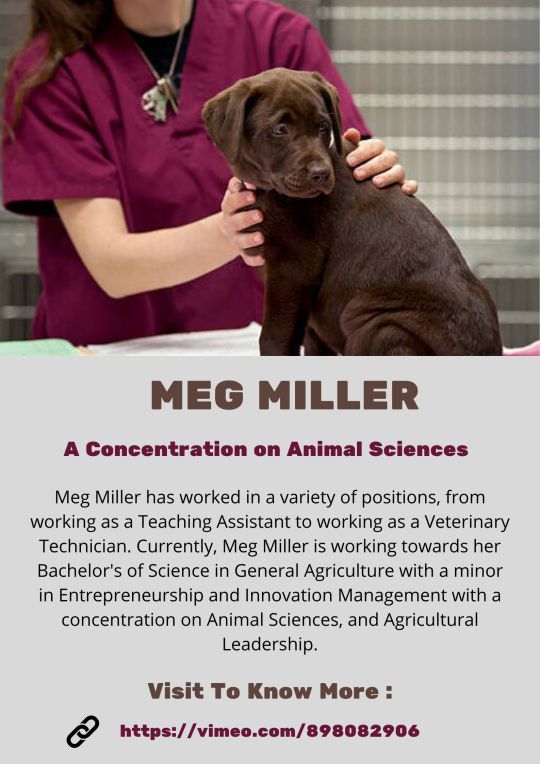
Meg Miller has worked in a variety of positions, from working as a Teaching Assistant to working as a Veterinary Technician. Currently, Meg Miller is working towards her Bachelor's of Science in General Agriculture with a minor in Entrepreneurship and Innovation Management with a concentration on Animal Sciences, and Agricultural Leadership.
1 note
·
View note
Text
Meg Miller - A Teaching Assistant
Meg Miller has been working with animals and in the field of agriculture for more than 4 years. From working as a veterinary technician to assuming the role of a teaching assistant for Biology of Animal Production, Meg Miller is well-versed when it comes to the industry of Agribusiness as it is today. Currently, Meg is in the process of pursuing her own Bachelor of Science in General Agriculture. She is also focusing on Agricultural Leadership, Animal Sciences, as well as Agribusiness management. Working in Agribusiness Management is nothing new for Meg Miller, who has been working hands-on with animals and in agriculture professionally for more than 4 years. Beginning in 2018 as a Veterinary Technician, Meg Miller has since expanded her teaching to positions such as an official teaching assistant for Biology of Animal Production at the College of Agriculture and Natural Resources in 2021. Today, Meg Miller is still continuing her education in the pursuit of a Bachelor of Science in General Agriculture.
1 note
·
View note
Text
Meg Miller - A Veterinary Technician
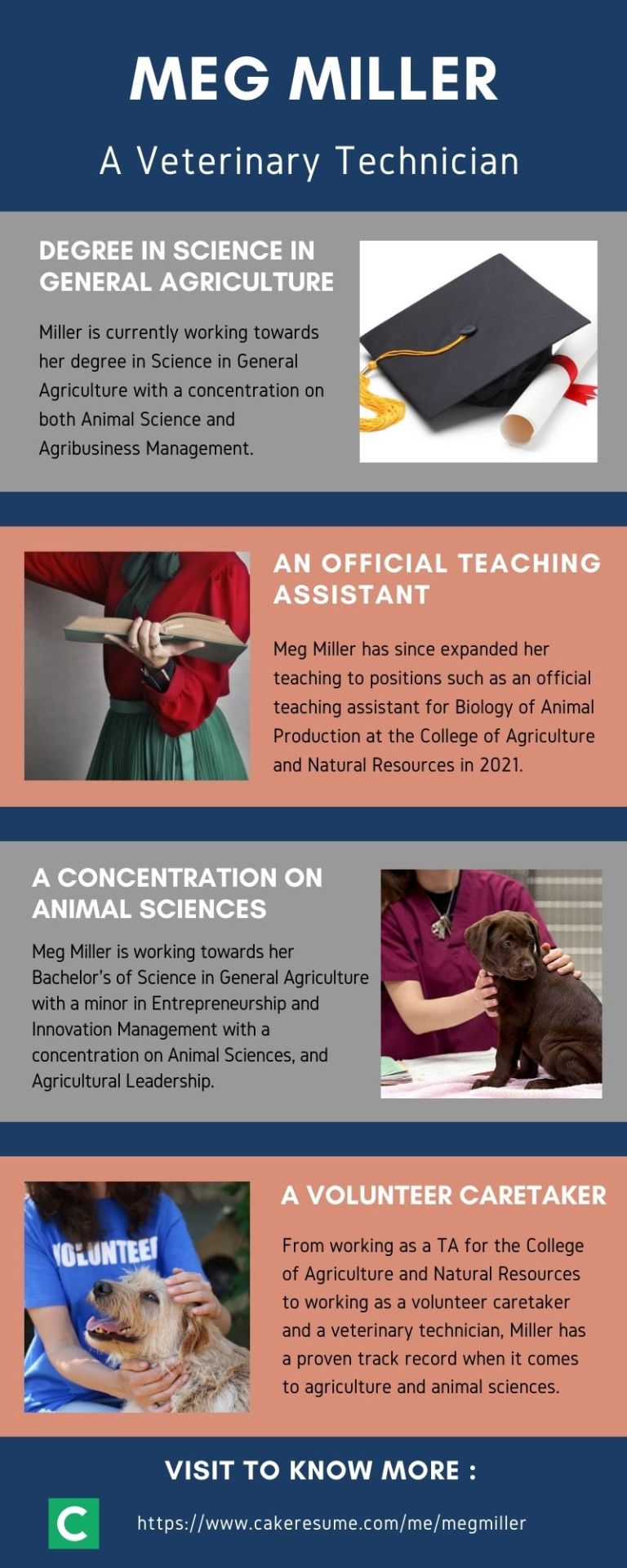
Meg Miller has a long history when it comes to working in a professional setting involving animals and agricultural research. From working as a Teaching Assistant for Biology of Animal Production for the College of Agriculture and Natural Resources to working as an official Veterinary Technician, Miller has no shortage of experience in the agricultural and animal sectors. Currently, Meg Miller is furthering her professional education at the University of Missouri, where she is working toward her degree in Science in General Agriculture.
1 note
·
View note
Text
Meg Miller - A Service Learning Volunteer
Meg Miller is hyperfocused when it comes to making serious changes in the agricultural and animal science industries. Working more than 4 years as a professional in multiple industries, Miller is also no stranger to the needs of those involved in animal caretaking, agribusiness leadership, and agricultural research.
1 note
·
View note
Text
Meg Miller - Working in Agribusiness Management
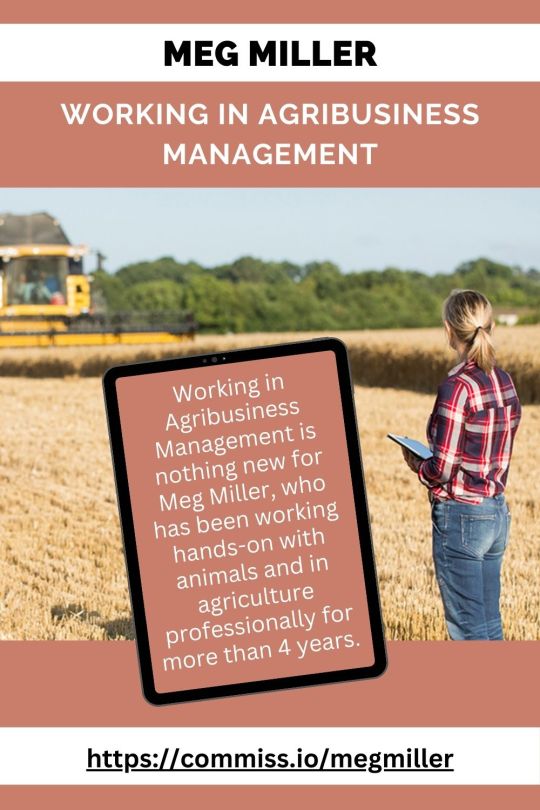
Meg Miller has a long history when it comes to working in a professional setting involving animals and agricultural research. From working as a Teaching Assistant for Biology of Animal Production for the College of Agriculture and Natural Resources to working as an official Veterinary Technician, Miller has no shortage of experience in the agricultural and animal sectors.
1 note
·
View note
Text
From Classroom to Field: Practical Lessons in Agriculture With Meg Miller
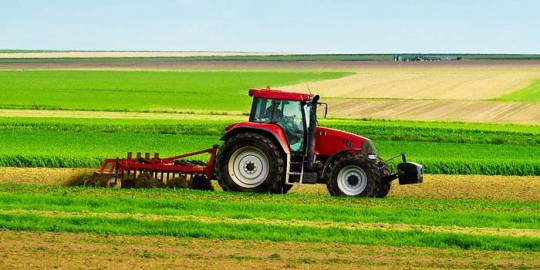
Agriculture, often referred to as the backbone of civilization, has undergone remarkable transformations from generation to generation. From traditional farming methods to modern technological interventions, the field of agriculture has continuously evolved, offering a diverse range of opportunities and challenges. While classroom education forms the foundation, it’s the practical lessons learned in the field that truly cultivate skilled and knowledgeable agriculturists. Agriculture expert Meg Miller has spent years bridging the gap between theoretical learning and hands-on experience. She lends her expertise to exploring the journey from the classroom to the field to discover the practical wisdom that propels aspiring agriculturists toward success.
The Classroom: Seeds of Knowledge Begin to Sprout
The classroom serves as the nucleus of agricultural education, offering students a comprehensive understanding of the theoretical aspects of farming, animal husbandry, and agribusiness management. Concepts such as soil composition, plant biology, animal nutrition, and supply chain dynamics are imparted through textbooks, lectures, and interactive discussions.
“Classroom learning provides a solid base for understanding the principles that govern agriculture,” says Miller. “It’s where you grasp the ‘why’ behind various practices and processes. But remember, this knowledge is like planting seeds. True growth happens when you take these concepts to the field.”
Transitioning to the Field: Where Theory Meets Reality
While classroom learning lays the groundwork, it’s the transition to the field that bridges the gap between theory and practice. Practical experiences provide invaluable insights that textbooks can’t replicate. Whether it’s tilling the soil, tending to livestock, or managing crop cycles, the field is where budding agriculturists truly hone their skills.
“Embrace the field as your greatest teacher,” advises Miller. “In a controlled classroom setting, everything seems straightforward, but the field introduces you to the unpredictability of nature and the nuances of real-world challenges. The mistakes you make here become the steppingstones to expertise.”
Learning from Mistakes: Nature’s Feedback Loop
The field isn’t just about success stories; it’s also where failures occur. However, these failures are not setbacks but rather opportunities for growth. Learning from mistakes is a pivotal part of becoming a skilled agriculturist.
Notes Miller, “Failure is a part of agriculture as much as success. In fact, it’s through failures that we often make our most significant breakthroughs. Each setback is a chance to understand your land, your animals, and your crops better. This process of trial-and-error molds you into a well-rounded expert.”
Holistic Learning: Integrating Lessons from Classroom and Field
The most successful agriculturists are those who seamlessly integrate classroom learning with field experiences. This holistic approach not only strengthens technical skills but also nurtures critical thinking and problem-solving abilities. The ability to connect theoretical knowledge to practical scenarios is what sets experts apart.
“Think of classroom and field learning as two halves of a whole,” suggests Miller. “What you learn in one realm enriches the other. When you encounter a challenge in the field, your classroom knowledge guides your decision-making. Likewise, field experiences can spark curiosity that drives deeper classroom engagement.”
Fostering Innovation: Applying Knowledge in New Ways
Agriculture is no longer confined to age-old practices. Today, innovation drives the industry forward. Agriculturists are increasingly adopting technology, sustainable practices, and creative solutions to address contemporary challenges. A forward-thinking approach is essential. Embrace innovation. Agriculture today demands an amalgamation of tradition and modernity. Blend your classroom education with new ideas. Experiment with technology, explore eco-friendly techniques, and be open to unconventional approaches. This synergy is where groundbreaking advancements arise.
The Ongoing Journey
Transitioning from the classroom to the field, the expedition toward mastery in agriculture unfolds as a vibrant and demanding odyssey, necessitating unwavering commitment, resilience, and an insatiable thirst for wisdom. As classroom teachings forge the bedrock, the crucible of real-world engagement forges these teachings into palpable proficiencies. Meg Miller’s insights illuminate the intricate interplay between these two domains and encourage embracing setbacks as stepping stones, fearlessly pioneering innovation, and allowing the field’s sagacity to harmonize with scholarly erudition. In the ever-evolving expanse of agriculture, it is pivotal to internalize that expertise burgeons through the alchemy of scholastic learning and hands-on involvement. This synergy endows practitioners with an enriched perspective, fusing theory and application, and culminating in a profound mastery of the agricultural realm.
Meg Miller: Bridging Education and Real-World Agriculture
With over four years of extensive experience in agriculture and animal management, Meg Miller boasts a comprehensive understanding of farm and homestead operations, alongside adept classroom management skills for educating enthusiastic students about agriculture and animal care. Currently pursuing a Science degree in General Agriculture, Meg’s academic focus spans Animal Science and Agribusiness Management, underscoring her commitment to these fields. In addition to her primary studies, she is dedicated to minors in Innovation Management and Entrepreneurship, showcasing her holistic approach to shaping the future of agriculture. Meg’s journey blends hands-on expertise with a passion for education and innovation, positioning her as a dynamic professional poised to make meaningful contributions to the agricultural landscape.
Originally published at https://nyweekly.com/ on September 19, 2023.
0 notes
Text
Essential Farm Management Practices: Insights from Agriculture Expert Meg Miller
Running a successful farm requires a combination of knowledge, skills, and dedication. To gain valuable insights into the essential practices for effective farm management, we turned to agriculture expert Meg Miller.
With her extensive experience and passion for the field, Miller has been instrumental in helping farmers, homesteaders, and aspiring agriculturalists understand the intricacies of managing a farm. In this article, we’ll delve into three key farm management practices, as shared by Meg Miller, that can contribute to the success of any agricultural operation.
Planning for Success
One of the fundamental aspects of farm management is thorough planning. Miller emphasizes the importance of setting clear goals and developing a well-defined roadmap to achieve them. She states, “Planning is the backbone of successful farm management. It allows you to align your resources, time, and efforts towards specific objectives.”
Meg Miller emphasizes the need to consider various factors during the planning process, such as market demand, available resources, and seasonal variations. She advises, “Analyzing market trends and consumer preferences can help you make informed decisions about what crops or livestock to focus on. Additionally, considering your available resources, such as land, equipment, and labor, is crucial for efficient resource allocation.”
Implementing Sustainable Practices
Sustainability is a buzzword in modern agriculture, and for good reason. Meg Miller highlights the significance of incorporating sustainable practices into farm management. “Sustainable farming ensures the long-term viability of your operation while minimizing its environmental impact,” she asserts.
Miller suggests employing practices like crop rotation, cover cropping, and integrated pest management to enhance soil health and reduce reliance on synthetic inputs. She adds, “Implementing precision agriculture techniques, such as variable-rate fertilization and irrigation, can optimize resource utilization and minimize waste.”
Moreover, Meg Miller emphasizes the importance of diversification as part of sustainable farm management. “Diversifying your farm’s production can provide stability and resilience in the face of market fluctuations or climate-related challenges,” she advises. By exploring alternative crops or value-added products, farmers can open up new revenue streams and mitigate risks associated with a single commodity.
Efficient Operations and Record-Keeping
Running an efficient farm requires effective management of operations and meticulous record-keeping. Miller highlights the significance of optimizing processes and maintaining comprehensive records. She states, “Efficiency can significantly impact your farm’s productivity and profitability.”
Meg Miller recommends leveraging technology to streamline tasks and monitor critical aspects of farm operations. “Adopting farm management software or utilizing digital tools for record-keeping can save time, improve accuracy, and provide valuable insights into your farm’s performance,” she suggests.
Record-keeping, according to Miller, is vital for informed decision-making and compliance purposes. “Maintaining detailed records of inputs, outputs, and financial transactions helps identify areas of improvement, track costs, and fulfill regulatory requirements,” she explains.
Final Thoughts
Effective farm management practices form the foundation of a successful agricultural operation. As highlighted by agriculture expert Meg Miller, strategic planning, sustainable practices, and efficient operations are key areas to focus on. By incorporating these practices into their daily routines, farmers can enhance productivity, minimize environmental impact, and optimize their overall farm performance.
About Meg Miller
Meg Miller has been working with animals and in the field of agriculture for more than 4 years. From working as a veterinary technician to assuming the role of a teaching assistant for Biology of Animal Production, Meg Miller is well-versed when it comes to the industry of Agribusiness as it is today. Currently, Meg is in the process of pursuing her own Bachelor of Science in General Agriculture. She is also focusing on Agricultural Leadership, Animal Sciences, as well as Agribusiness management.
Originally published at https://www.theamericanreporter.com on July 27, 2023.
0 notes